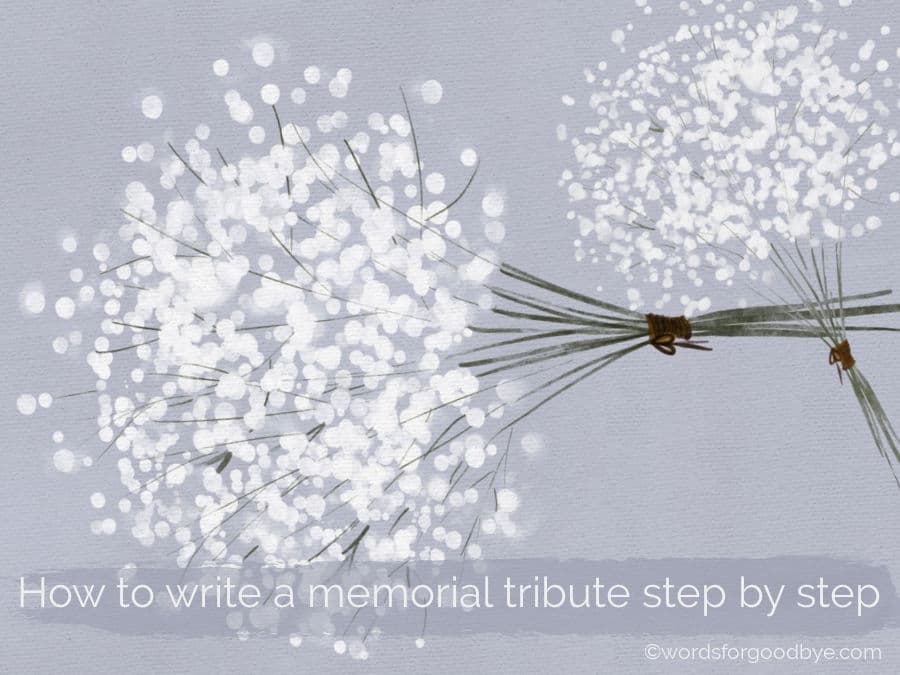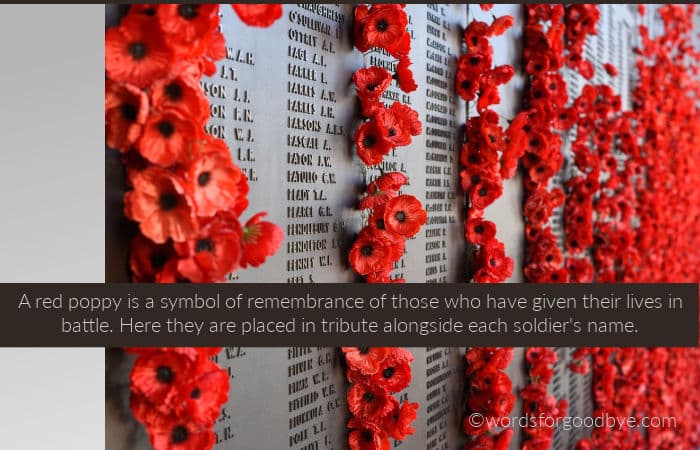- HOME ›
- How to write a memorial
How to write a memorial
Preparing a eulogy or tribute speech step by step
By: Susan Dugdale
Although it may not feel like it, having a memorial tribute or eulogy to write is a gift and a privilege. The task may seem, extraordinarily difficult.
Just how do you squeeze a lifetime's worth of memories into one six minute speech? And make it a special, memorable, and unique speech to capture the essence of a person?
However, if you follow the step by step guidelines below you can, and will give a sincere and fitting funeral speech or tribute.
I understand about being caught in the maelstrom of feelings triggered by the death of someone you love. I know finding the clarity to make decisions about what to write in a eulogy can feel overwhelmingly impossible.
There is so much we want to say. Trying to compress a whole life into a few minutes seems ridiculous, almost an insult.
However there is a way through. Let me show you how to write a eulogy, step by step.

What's on this long page
You'll find:
- help to understand the importance of spending time carefully crafting a memorial
- help to understand the purpose and value of a eulogy
- the background information you need before you begin to write
- what to include in a eulogy
- how to collect the material you want
- the step by step process of writing the memorial
- a free printable fill-in-the-blanks memorial planning template with examples to use if you want to. It will guide you through the whole process of collecting and structuring your material. (Scroll down for the download instructions.)
- information on how to rehearse and prepare yourself for delivering the memorial tribute as best you can
Please don't rush. Take your time and, go gently.
Why go through the process of writing a memorial speech?
Some people question the need to actually write a eulogy: to put words on paper. They would prefer to stand and speak spontaneously, from the heart, trusting the inspiration of the moment to carry them through.
There are several very good reasons to sidestep that temptation.
For starters, many people find giving any type of speech, without conscious, careful preparation, a challenge. We tend to drift off topic or lose the thread connecting our ideas.
Now, add the pressure of the occasion and understandably feeling upset. Do you see what might happen?
Preparation will give your memorial tribute structure - a definite pattern, a beginning, middle and end. That structure will help you contain and express your feelings as you choose to, lessening the likelihood of being overwhelmed by them.
Without the safety of form your funeral speech may become a tearful ramble with no obvious purpose or direction. That is distressing for everybody: the speaker and the hearers.
Taking the time to fully prepare the speech is the best way to express all you want to, the way you want to.
Understanding the purpose of a eulogy
When you understand what a prepared eulogy can do you'll realize it's a gift to the living. Your words will help everyone, (yourself included), on the journey each of us must take through the grief of loss.
A eulogy is a reflection
A eulogy is like a mirror or reflection. We listen to the stories told to hear and see in our imagination what the life of our loved one was all about. We want to understand, to have it make sense to us.
A eulogy may not provide answers to any difficult questions we may have about our dearly departed but it allows us to focus more clearly.
A memorable speech prepared with loving care celebrates the whole person: their strengths, their joys, challenges and achievements.
At a time when many are emotionally fragile, your courage to stand in front of friends and family and speak will be truly appreciated.
Take a deep breath and follow the steps.
How to write a eulogy
Before you begin; who are you writing for?
- Are you writing on behalf of the immediate family?
- Have you been asked to be the principal spokesperson, or will others be talking too?
- Or are you writing about your own relationship?
- Are you writing as work colleague, a friend...?
The answers to those questions put you, the eulogy giver, in context, which is important to those listening. (If they don't know, they'll want to know how you fitted into the life of the person you are celebrating.) And they also help determine what content you'll cover.
How long is a eulogy/memorial expected to be?
The general rule is somewhere between 3 to 7 minutes. If you want a specific length of time check with the person conducting or organizing the service to make sure you can safely take what you want without disrupting the program.
What to include in a eulogy:
- A brief introduction of yourself and where you fitted in the person's life
- Personal stories: anecdotes, songs, poetry, humor ...
Anything at all that speaks true.
Subjects to by-pass
Be honest without dwelling on or re-living negativity.
The eulogy is not an occasion to 'get even' or, to expose family secrets.
If the person was bowed down with challenges, talk about them compassionately, and respectfully, if you must.
Remember a funeral speech is an opportunity to honor and even the most difficult personality, or life, will have aspects worthy of celebration.
(And while we're discussing what subject matter it's best or diplomatic to avoid; political opinions or religious differences don't really belong in a eulogy either.)
Asking for contributions
If you're speaking on behalf of others ask friends, family or work colleagues for their recollections and stories to add to your own.
There is no need for you to carry the responsibility of putting together the eulogy alone. Let others share in the privilege of shaping the memorial to honor your loved one's life.
Telling the stories
Do resist the urge to list in chronological order achievements or milestones. These can be dry, dull facts.
Instead, please tell the stories! They may have been heard many times but in their telling the essence or life force of your loved one lives on. This is the real person who people want to hear about and remember. Lists don't give that.
Writing the memorial: tone
What tone do you want to use?
Do you want it to be solemn? Do you want it to be lighter, perhaps even humorous? Or do you want a balance of both?
To help decide ask yourself; what would your loved one have wanted? Be guided by your answer. There are no "right" or "wrong" ways. This a decision for yourself, the family and friends. A life contains joy as well as sorrow and laughing through tears can be a real reflection of that.
Writing the memorial: order of content
Go through your collection of material selecting what gives an accurate portrayal. You won't be able to include everything but what you do choose, you'll want to resonate with the 'truth' of the person.
Put your choices of material in the order you want them come when you write the eulogy.
It might look this:
Introduction:
Statement of who I am and relationship to loved one
Body:
- Story one, or poem, or song, or reading
- Story two, or poem, or song, or reading
- Story three, or poem, or song, or reading
Conclusion:
Restatement of main message or theme from body of eulogy
Writing the memorial: where to begin
Begin with the body of the funeral speech
This is where you will be sharing all the stories you've collected together: the ones celebrating this unique, loved, special person.
If you can't get straight into writing, record your stories on your phone, or telling them to another person may help kick start the process for you.
Remember to go straight to the heart of each story. Long preambles are not needed. Include enough for listeners to make sense of it and no more.
Here's an example. It's a true story. I didn't use it in my Mother's eulogy but sharing it now is a little like giving her another small one years later.
Leaving home and the yellow blouse

"I'm going to tell you the story of the yellow blouse.
I was 18 and leaving home. We had very little money and certainly none for luxuries and that's what new clothes were. Ours were hand-me-downs from cousins.
What money Mum got each week was carefully placed in a series of jars in a cupboard above the sink in the kitchen. Each had a label. This was for 'Food', that for 'Electricity' etc. The jars were often empty but miraculously, our stomachs never were.
The day came for going. I had made 'new clothes' from old ones. They were folded, ready for packing. As I closed the lid on my suitcase, my mother gave me a parcel.
Inside was a new store-bought yellow blouse, beautifully tailored and made of fine cloth. 'A girl must have at least one quality garment.' she said. It was extraordinary. I knew the path to that blouse had been 5 cents by 5 cents by 5 cents over months. I also knew this was love."
Link your stories/poems/songs/readings/quotes together so one leads into another. Think of them as beads you are threading to form a necklace. Each is part of the whole.
Write the conclusion
What enduring message do you want your listeners to carry away with them?
It may be a simple thank-you for the life you've shared with your loved one or it could be a special quote expressing an idea or feeling you know is appropriate. As this is the last opportunity to pay tribute, think carefully. You'll want to get it as "right" as you can.
Write the opening
Now you have the rest of your memorial it will be easier to write the opening.
Unless you're being introduced by someone else be sure to include who you are at the very beginning.
Once that is done think about the major events, relationships and general characteristics making this person's life special.
For example:
'Sophie was my Mother but she was also Mother to four more: Fred, Isobel, Warren and Gwen. Many of you know her as aunt, cousin, friend and colleague but whatever the relationship, we all know her as a woman who played many roles over the course of her life.
She was the bright and beautiful women who married my father after a war-time whirl wind romance. She was the determined young bride who taught herself to cook and sew. She was ...
We all have memories of Sophie. I want to share some of my most precious with you now.'
That last sentence leads into the body of the speech: the specific stories you've chosen to tell.
Would a eulogy planning template help?
I've taken all the information on this page about the step by step process of writing a memorial, and put it into a free 15 page printable. You'll find instructions and examples alongside fill-in-the-blank slots for you to enter what you want to say.
Complete it and you'll have a well structured first draft. Of course, you'll still need to edit, polish and rehearse it, but you'll be well on your way.
Click on the image below to download it.
Practice and rehearsal
Go through your first draft reading it aloud as if you were delivering it. This helps you make sure that what you've written makes sense.
It also helps if you have someone listen to you to give you feedback. A pair of independent ears will pick up things you might otherwise miss.
As you read, check the following:
- Does your material flow from one idea to the next?
- Are the opening and closing remarks fitting?
- Have you varied your language and sentence length to keep it interesting to listen to?
- If you hear yourself repeating the same phrases over and over again, either cut them out or find other language to express the idea.
- Listen to hear if you are rambling without real point or direction or you've repeated the same or a similar story without realizing it.
- Time yourself and make sure your speech fits the time allowance.
- (If you've not been given a time allowance, approximately 3-7 minutes is about average. Although this may seem very brief, it does have advantages. Firstly, it gives other people who may be speaking time to do so. Secondly, it focuses your speech and helps you to decide what is important to say.)
- Make any adjustments and write your second draft.
- Go through the same process again and once more get someone to listen and give you feedback. Check the timing.
- When you're satisfied you have it right, prepare your final copy.
Preparing your notes for printing
If you've written what you want to say in a word document on your computer, BEFORE YOU PRINT IT OUT:
- Make sure the font is large enough to be easily read at a glance.
- Double space each line for easy reading.
- Number your pages clearly.
- Select single-side printing.
- If you're using a poem or reading include the text in the body of your notes. This is less stressful than trying to read from a book or books. It's simpler to deal with one item (your notes) rather than try to manage several under pressure. But if you must use the original text make sure you bookmark your place clearly so you do not have the added hassle of trying to find the right page while everybody waits.
At the venue
- If it's available, use a lectern or stand for your notes rather than hold them. When you hand-hold notes the temptation to rattle, or mask your face with them, might be too much to withstand.
- Practice breathing deeply before you stand to talk to calm yourself.
- Have a glass of water available.
- Do not worry if you "wobble" or falter. Tears and/or being unable to speak for a moment or two are natural. Do not fight them. Have a tissue handy. Blow your nose, wipe your eyes, have a sip of water and carry on. People will not judge you. Tears are not a loss of dignity. Your listeners' will admire your courage.
- If you do have to stop, do not apologize. Nobody is expecting a flawless performance.
- If you wish, take a support person to stand beside you to give you strength.
- If you have time, practice in the venue.
In conclusion
Remember having a memorial to write is both a gift and a privilege.
In fact, it's a gift twice over. Firstly, because you are giving your energy, time and love to honor the life of someone precious to you. And it's also a gift to your listeners as it will help the healing process for everybody, including yourself.
Giving a eulogy is a privilege because it signifies your value or importance in the life of the person who has died and in the lives of their family and friends. Being asked to speak shows trust and respect. You are being trusted to encapsulate a life fittingly and deliver the unique essence of the person everyone loved publicly.
I hope these notes are useful to you. If you have questions, ask them via my contact form . I would be happy and honored to assist.
Go well.
(This article was originally published on write-out-loud.com)



